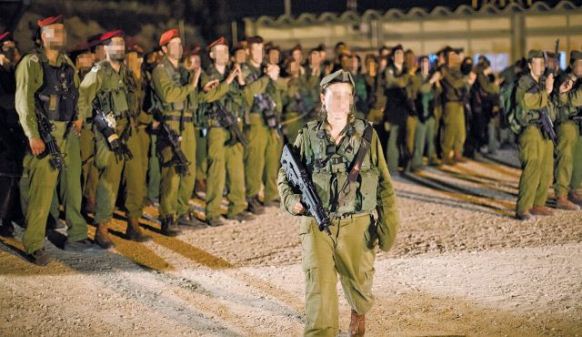From L.A. Surfer Girl To A Lone Soldier
Jul 8, 2013

A swearing-in ceremony for Jacqui, a female lone soldier, and her unit last month.
Photo by Emil Salman
The high school class notes feature the usual kinds of updates: Dominic is living in New York with his girlfriend and new puppy. Brent is working at Atlantic Records. Melissa is doing a year as an AmeriCorps fellow and Lindsey is heading to law school in the Bay Area.
And then there is Jacqui. She is sweating her way through combat training - sleep deprived, unshowered, living in a crowded tent, eating canned beef and getting bossed around by officers younger than her, who are yelling in a language she only half-understands.
Did the 23-year-old Los Angeles surfer girl and newly minted college grad, with no family in Israel and no obligation to serve in its military, ever consider that joining the Israel Defense Forces was a little unusual? Weird even? Crazy, as some might go so far as to suggest?
"Um, not really," the petite, blue-eyed blonde retorts, as she hurdles through the darkness in the hills outside Jerusalem with her unit: camouflage paint on her face, a Micro Tavor assault rifle on her hip, a year to the day since she graduated from the University of Southern California with a degree in international relations.
"Why did I come?" she repeats the question. "It's just something I always felt I needed and wanted to do," continues Jacqui calmly, brushing strings of sweaty hair away from her eyes and turning her attention to a certain Yael, who is straggling behind, heaving, and on the verge of tears. "Come on! Move! Move!" Jacqui admonishes in accented Hebrew, joining forces with a third girl, as together they pull their unit-mate along by her flap-jacket straps.
Australian-born Jacqui moved to California as a child and grew up in what she describes, with a grin, as an "obsessively" Zionist household, complete with requisite Jewish day school in L.A., family Shabbat dinners, summers at Camp Ramah, frequent trips to Israel and a Young Judaea gap year program in Israel, which, she says, really clinched the whole thing for her.
"I didn't want to go back for college after that year, but I was not sure how to join the army then," she says. "My whole first year at USC I felt like I would die because I was not in Israel."
Four years and a degree later, with those feelings lingering, Jacqui, with the help of Garin Tzabar - a program run by Israel's scouts movement and the Absorption Ministry that offers a support community for prospective soldiers whose families are not in Israel - started her journey back to Israel to attempt the path not taken.
Garin Tzabar was created 20 years ago by a group of Israeli families in San Francisco who wanted to help their children navigate the emotional and bureaucratic return to Israel to do military service. There were 30 participants that first year.
Today, there are more than 350 who sign up a year, hailing mainly from North America, but also from Eastern and Western Europe, Australia, South America and South Africa.
They come from Zionist and Israeli families - and equally from those who have never been to Israel, those who know much about the country, and even those ambivalent or against their children being there.
These youngsters, who are anywhere from 18 to 23 years old (22 for girls ) when they enlist, are, like any soldier without family in the country, whether through Tzabar, another program or independently, called "lone soldiers."
Read the full article here.



